MEDIA RELEASE
Support WikiLeaks rally called
Supporters of the website Wikileaks will mobilise on Friday (10/12/10) to protest against the backlash it has faced for its release of more than 250,000 US government cables.
The protest will hear from independent journalist Antony Loewenstein, award-winning author of My Israel Question. Pirate Party spokesperson Simon Frew will also speak. Other speakers will be announced soon.
The rally date coincides with International Human Rights Day. Rally organisers say the Australian government has failed to uphold the human rights of Wikileaks editor-in-chief Julian Assange.
“The Australian government should be ashamed for its attacks on Wikileaks, which has been charged with no crime”, spokesperson Simon Butler said.
“Australia should not join the campaign to censor Wikileaks. Wikileaks has released evidence of government lies and duplicity — information that, as citizens, we have a right to know.
“We want the Gillard government to make sure Julian Assange has the same basic rights as every other Australian citizen. Threats have been made against Assange’s life, the Australian government has a duty to protect him, not threaten him.”
Butler said community support for Wikileaks was very high. “We expect a good turnout to the rally. There is a great deal of anger at what’s happening. The bid to silence Wikileaks threatens the rights of everyone.”
The rally will take place at Sydney Town Hall @ 1pm, Friday December 10.
Rally information: [contact details redacted on request]
Media contact: Simon Butler 0421 231 011
(via @antloewenstein)
A number of prominent Australian and international personalities have drafted an open letter to Australian Prime Minister Julia Gillard in protest of the government's treatment of Julian Assange. We are taking the liberty of reproducing the letter below. Please visit the ABC site to see all the signatories and add your support:
"Dear Prime Minister,
We note with concern the increasingly violent rhetoric directed towards Julian Assange of WikiLeaks.
“We should treat Mr Assange the same way as other high-value terrorist targets: Kill him,” writes conservative columnist Jeffrey T Kuhner in the Washington Times.
William Kristol, former chief of staff to vice president Dan Quayle, asks, “Why can’t we use our various assets to harass, snatch or neutralize Julian Assange and his collaborators, wherever they are?”
“Why isn’t Julian Assange dead?” writes the prominent US pundit Jonah Goldberg.
“The CIA should have already killed Julian Assange,” says John Hawkins on the Right Wing News site.
Sarah Palin, a likely presidential candidate, compares Assange to an Al Qaeda leader; Rick Santorum, former Pennsylvania senator and potential presidential contender, accuses Assange of “terrorism”.
And so on and so forth.
Such calls cannot be dismissed as bluster. Over the last decade, we have seen the normalisation of extrajudicial measures once unthinkable, from ‘extraordinary rendition’ (kidnapping) to ‘enhanced interrogation’ (torture).
In that context, we now have grave concerns for Mr Assange’s wellbeing.
Irrespective of the political controversies surrounding WikiLeaks, Mr Assange remains entitled to conduct his affairs in safety, and to receive procedural fairness in any legal proceedings against him.
As is well known, Mr Assange is an Australian citizen.
Dan Gillmor, Salon: Defend WikiLeaks or lose free speech
"Journalists cover wars by not taking sides. But when the war is on free speech itself, neutrality is no longer an option.
The WikiLeaks releases are a pivotal moment in the future of journalism. They raise any number of ethical and legal issues for journalists, but one is becoming paramount.
As I said last week, and feel obliged to say again today, our government -- and its allies, willing or coerced, in foreign governments and corporations -- are waging a powerful war against freedom of speech.
WikiLeaks may well make us uncomfortable in some of what it does, though in general I believe it's done far more good than harm so far. We need to recognize, however, as Mathew Ingram wrote over the weekend, that "Like It or Not, WikiLeaks is a Media Entity." What our government is trying to do to WikiLeaks now is lawless in stunning ways, as Salon's Glenn Greenwald forcefully argued today.[...]
Media organizations with even half a clue need to recognize what is at stake at this point. It's more than immediate self-interest, namely their own ability to do their jobs. It's about the much more important result if they can't. If journalism can routinely be shut down the way the government wants to do this time, we'll have thrown out free speech in this lawless frenzy."
Read more
The Hindu: Editorial: Digital McCarthyism
The Guardian reported that, after the new European Arrest Warrant had been received by SOCA, Julian Assange's lawyers were in talks with the police to arrange a meeting:
"Jennifer Robinson, a solicitor with Finers Stephens Innocent which represents the Australian freedom of information campaigner, told the Guardian: 'We have a received an arrest warrant [related to claims in Sweden]. We are negotiating a meeting with police.'
Another lawyer representing Assange, Mark Stephens, added: 'He has not been charged with anything. We are in the process of making arrangements to meet the police by consent in order to facilitate the taking of that question and answer that is needed ... It's about time we got to the end of the day and we got some truth, justice and rule of law.'"
While there have been reports that Julian Assange would appear before a UK court tomorrow in order to negotiate bail, The Australian quotes Mark Stephens saying: "I haven't arranged any court hearing for tomorrow. I'm still in the midst of my discussions about how this is going to work. Nothing has been agreed definitively. There is discussion of meeting up with police but we haven't got to that point yet. Schedules have to be worked out. Their team has to be ready and we have to be ready. They have ten days to act on this warrant so there is time."
Stephens went on to reiterate that "Their request is to interview Julian Assange - he's not been charged with anything - and we are in the process of making arrangements to meet with the police by consent in order to facilitate the taking of that question and answer."
Today, PostFinance, the banking arm of SwissPost, announced that it closed the account created for the Julian Assange Defence Fund, on the grounds that he provided a Geneva address while not being a Swiss resident. WikiLeaks has clarified that the address provided belonged to his lawyer. PostFinance Alex Josty told AP that "That's his money, he will get his money back. We just close the account and that's it." However, Marc Andrey, another PostFinance spokesman, told The New York Times that "efforts to contact Mr. Assange to arrange for the funds in the account to be transferred had been unsuccessful." The status of the funds appears unclear.
Australia Post has announced on Friday that it would be closing the University of Melbourne Post Office on December 17, and, according to the Sydney Morning Herald, insisted that the closure "has nothing to do with the fact that Box 4080 is the Australian postal address for submissions to the whistleblower website." The post pox has long been used by WikiLeaks for submissions and donations via postal mail. "Coincidence? Or has the ever-closing security net around WikiLeaks been tightened a notch further?", asks the Herald's Daniel Flitton. "The architecture and planning building, where the post office is located, is to be demolished soon. But plans are not yet fixed and insiders expressed 'surprise' Australia Post had decided to close so early."
PRESS RELEASE
Tue 7 Dec 15.55 GMT
Julian Assange Defense Fund frozen.
The Swiss Bank Post Finance today issues a press release stating that it had frozen Julian Assange's defense fund and personal assets (31K EUR) after reviewing him as a "high profile" individual.
The technicality used to seize the defense fund was that Mr. Assange, as a homeless refugee attempting to gain residency in Switzerland, had used his lawyers address in Geneva for the bank's correspondence.
Late last week, the internet payment giant PayPal, froze 60Keur of donations to the German charity the Wau Holland Foundation, which were targeted to promote the sharing of knowledge via WikiLeaks.
WikiLeaks and Julian have lost 100Keur in assets this week.
One of the most fascinating aspects of the Cablegate exposure is how it is throwing into relief the power dynamics between supposedly independent states like Switzerland, Sweden and Australia.
WikiLeaks also has public bank accounts in Iceland (preferred) and Germany.
Please help cover our expenditures while we fight to get our assets back.
http://wikileaks.ch/support.html
END
(Via @wikileaks. Source: http://www.twitlonger.com/show/7bg5kc )
(If you missed the previous installments in this series, please click here.)
New Zealand Herald: Editorial: Red alert over WikiLeaks unnecessary
"Secretary of State Hillary Clinton has suggested the disclosure "puts people's lives in danger, threatens our national security and undermines our efforts to work with other countries to solve shared problems". Such language does not bode well for a cogent and calculated response. In fact, the intelligence information released so far contains nothing to substantiate Mrs Clinton's claims.[...]
Obviously, Washington is embarrassed. But, so far, that is all. There has, contrary to the Secretary of State's view, been no irresponsible naming and endangering of individual lives or national security.
Much of the credit for this must go to WikiLeaks' decision, as with military documents released this year, to rely on three major newspapers - the Guardian, the New York Times and Der Spiegel - for a reasoned analysis of the cables. This has been no anarchic exercise, based on a naive view that it is right and proper for all information to be in the public domain.[...]
The cork is out of the bottle. If WikiLeaks is silenced, others will pick up its ideas."
Read more
Paul Craig Roberts, CounterPunch: What the Wiki-Saga Teaches Us
"The reaction to WikiLeaks and its founder, Julian Assange tells us all we need to know about the total corruption of our “modern” world, which in fact is a throwback to the Dark Ages.
Some member of the United States government released to WikiLeaks the documents that are now controversial. The documents are controversial, because they are official US documents and show all too clearly that the US government is a duplicitous entity whose raison d’etre is to control every other government.
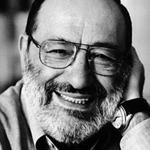
(This article originally appeared in Libération)
"So why so much ado about these leaks? For one thing, they say what any savvy observer already knows: that the embassies, at least since the end of World War II, and since heads of state can call each other up or fly over to meet for dinner, have lost their diplomatic function and, but for the occasional ceremonial function, have morphed into espionage centres. Anyone who watches investigative documentaries knows that full well, and it is only out of hypocrisy that we feign ignorance. Still, repeating that in public constitutes a breach of the duty of hypocrisy, and puts American diplomacy in a lousy light.[...]
But let’s turn to the more profound significance of what has occurred. Formerly, back in the days of Orwell, every power could be conceived of as a Big Brother watching over its subjects’ every move. The Orwellian prophecy came completely true once the powers that be could monitor every phone call made by the citizen, every hotel he stayed in, every toll road he took and so on and so forth. The citizen became the total victim of the watchful eye of the state. But when it transpires, as it has now, that even the crypts of state secrets are not beyond the hacker’s grasp, the surveillance ceases to work only one-way and becomes circular. The state has its eye on every citizen, but every citizen, or at least every hacker – the citizens’ self-appointed avenger – can pry into the state’s every secret.[...]
One last observation: In days of yore, the press would try to figure out what was hatching sub rosa inside the embassies. Nowadays, it’s the embassies that are asking the press for the inside story."
Read more
The Guardian: WikiLeaks cables portray Saudi Arabia as a cash machine for terrorists
"Saudi Arabia is the world's largest source of funds for Islamist militant groups such as the Afghan Taliban and Lashkar-e-Taiba – but the Saudi government is reluctant to stem the flow of money, according to Hillary Clinton.
"More needs to be done since Saudi Arabia remains a critical financial support base for al-Qaida, the Taliban, LeT and other terrorist groups," says a secret December 2009 paper signed by the US secretary of state. Her memo urged US diplomats to redouble their efforts to stop Gulf money reaching extremists in Pakistan and Afghanistan.
"Donors in Saudi Arabia constitute the most significant source of funding to Sunni terrorist groups worldwide," she said. Three other Arab countries are listed as sources of militant money: Qatar, Kuwait and the United Arab Emirates."
Read more
The Guardian: Brazil denied existence of Islamist militants, WikiLeaks cables show
"Brazil's government covered up the existence of Islamist terrorist suspects in São Paulo and border areas in an apparent bid to protect the country's image, according to secret US documents released by WikiLeaks.
The administration of former president Luiz Inácio Lula da Silva publicly denied that militant Islamists were active in Brazil, even while its law enforcement agencies co-operated closely with the US in monitoring suspects.
"Despite publicly expressed sentiments of high-level officials denying the existence of proven terrorist activity on Brazilian soil, Brazil's intelligence and law enforcement services are rightly concerned that terrorists could exploit Brazilian territory to support and facilitate terrorist attacks, whether domestically or abroad," said a US embassy cable."
"The first serious infowar is now engaged. The field of battle is WikiLeaks. You are the troops," wrote John Perry Barlow on Twitter.
The censorship vs. free speech battle is escalating. This week has seen Amazon, Tableau, EveryDNS and PayPal dropping WikiLeaks services in quick succession, DDoS attacks that caused the site to go offline multiple times, and mounting political pressure from the US (2), Australian and French governments.
The US government went so far as to warn Switzerland against granting Julian Assange political asylum, reports 20 Minuten. In an open letter in Der Sonntag, the US ambassador to Switzerland, Donald Beyer, wrote that "Switzerland will have to consider very carefully whether to provide shelter to someone who is a fugitive from justice." However Swiss politicians including Cédric Wermuth, president of the Young Socialist Party, Bastien Girod, president of the Greens National Council, and the Swiss Pirate Party have reiterated their support for Assange and willingness to grant him asylum.
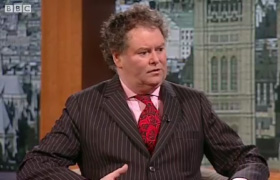
In an interview with the BBC's Andrew Marr, lawyer Mark Stephens said:
"In Sweden it's quite bizarre though, because the chief prosecutor, the director of public prosecution in Sweden dropped the entire case against him, saying there was absolutely nothing for him to face, back in September. And then, a few weeks ago, after the intervention of a Swedish politician, a new prosecutor, not in Stockholm, where Julian and these women had been, but in Gothenburg, began a new case, which of course has resulted in these warrants and of course the Interpol red notice being put out across this week.
It does seem to be a political stunt, I mean, I have, and his Swedish lawyer, have been trying to get in touch with the prosecutors since August. Now, usually, it's the prosecutor who does the pursuing, not the pursued. And in this particular case, Julian Assange has tried to vindicate himself, has tried to meet with the prosecutors, to have his good name restored."
He remarked that "A warrant was issued on Thursday by reports. We've asked for it. We've been ignored at this point," adding that "He's only wanted for interview, why not have that interview by consent, rather than this show trial?"
He also talked about the calls for assassination coming from "credible sources around the world," and particularly the United States, including people as high up as Sarah Palin. He said that Julian Assange would certainly fight deportation to Sweden on the grounds that it could lead to him being handed over to the US, where senior politicians have called for him to be executed.
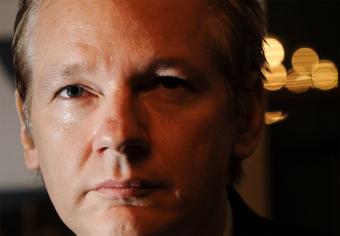
Julian Assange: "Geopolitics will be separated into pre and post 'Cablegate'"
El País features an interview with Julian Assange in the December 5th edition. He talked about the numerous death threats he has been receiving, the attacks against WikiLeaks, the significance of the Cablegate release, and fighting the Swedish case allegations.
On death threats: "We have hundreds of specific death threats from US military militants. That is not unusual, and we have become practiced from past experiences at ignoring such threats from Islamic extremists, African kleptocrats and so on. Recently the situation has changed with these threats now extending out to our lawyers and my children. However it is the specific calls from the elites of US society for our assassination, kidnapping and execution that is more concerning. These range from a US senate bill by John Ensign which seeks to declare us a "transnational threat" to assassination calls from former Bush speechwriters such as Marc Thiessen in The Washington Post and Bill O'Reilly of Fox News."
On the consequences of Cablegate: "It is too early to say yet. The ripples are just starting to flow throughout the world. But I believe geopolitics will be separated into pre and post Cablegate phases."
On the Swedish charges: "We will fight them and expose them, naturally. That there is something "wrong" with this case is now obvious to everyone."
Read the full interview in English or Spanish
Photo credit: AFP
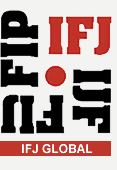
IFJ Condemns United States "Desperate and Dangerous" Backlash over WikiLeaks
The International Federation of Journalists (IFJ) today condemned the political backlash being mounted against the whistle-blowing website WikiLeaks and accused the United States of attacking free speech after it put pressure on the website's host server to shut down the site yesterday.
The website's host Amazon.com blocked access to WikiLeaks after United States officials condemned the torrent of revelations about political, business and diplomatic affairs that has given people around the world unprecedented access to detailed information from United States sources, much of it embarrassing to leading public figures.
"It is unacceptable to try to deny people the right to know," said Aidan White, IFJ General Secretary. "These revelations may be embarrassing in their detail, but they also expose corruption and double-dealing in public life that is worthy of public scrutiny. The response of the United States is desperate and dangerous because it goes against fundamental principles of free speech and democracy."
The IFJ has taken no position on the justification for the release of hundreds of thousands of internal documents which have made headlines around the world in the last few days, but it has welcomed the decision of WikiLeaks to use respected channels of journalism including Der Spiegel, The Guardian, the New York Times, Le Monde and El Pais to filter the information.
By Darren Bailey, Barrister and Solicitor of the Supreme Court of South Australia
Submitted on 04 December 2010
Subject: Julian Assange
Dear Prime Minister,
I wish to strongly associate myself with the letter addressed to you from NSW Supreme Court solicitor Peter Kemp, dated 4 December 2010, concerning the treatment of Mr Julian Assange.
His rights as an Australian citizen are clearly being infringed and should be vigorously protected "though the heavens may fall". As this nation's Prime Minister, and as a lawyer yourself, you ought to know this fact far better than your official statements would indicate.
Please address this issue as a matter of urgency. Demonstrate that to be an Australian citizen actually counts for something.
Sincerely,
Darren Bailey
Solicitor of the Supreme Court of South Australia
The Swiss Pirate Party, who was hosting the wikileaks.ch domain, has told The Associated Press that their main server in France has gone offline. Dennis Simonet, speaking for the Swiss Pirate Party, was unable to confirm the cause of the server problems.
The wikileaks.ch domain is being redirected to Bahnhof servers. The move is expected to take a few hours.
In the meantime, the site is accessible at http://46.59.1.2/
A list of mirrors is available at http://savewikileaks.net/another-wikileaks-address/
The Guardian: WikiLeaks cables blame Chinese government for Google hacking
"The hacking of Google that forced the search engine to withdraw from mainland China was orchestrated by a senior member of the communist politburo, according to classified information sent by US diplomats to Hillary Clinton's state department in Washington.
The leading politician became hostile to Google after he searched his own name and found articles criticising him personally, leaked cables from the US embassy in Beijing say.
That single act prompted a politically inspired assault on Google, forcing it to "walk away from a potential market of 400 million internet users" in January this year, amid a highly publicised row about internet censorship."
Read more
The Guardian: WikiLeaks cables: Spanish PM helped GE beat Rolls-Royce to helicopter deal
"Rolls-Royce lost a lucrative contract to supply helicopter engines to the Spanish military because of a personal intervention by Spain's prime minister, José Luis Zapatero, following vigorous lobbying from US diplomats, according to a secret cable from the US embassy in Madrid.
Eduardo Aguirre, the departing US ambassador to Spain, recounts behind-the-scenes diplomatic machinations that helped General Electric snatch a deal away from Rolls-Royce to provide engines for a state-of-the-art fleet of helicopters bought by the Spanish armed forces, a contract estimated by industry experts to be worth more than £200m.
Details of how Britain's best-known engineering company lost out to the Americans will fuel concerns that the so-called UK-US special relationship does not always deliver results."
Read more
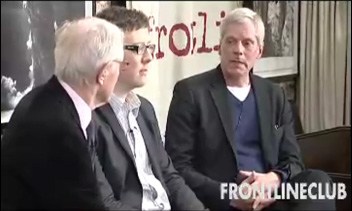
Frontline Club: WikiLeaks - The US embassy cables
This event, held on December 1st, featured WikiLeaks spokesman Kristinn Hrafnsson and data journalist James Ball in a discussion with Colleen Graffy, former deputy assistant secretary of state for public diplomacy (US State Department), and Sir Richard Dalton, associate fellow of the Middle East and North Africa programme at Chatham House. The discussion was moderated by author and broadcaster Tom Fenton.
The video recording of the event is now available on the Frontline website.
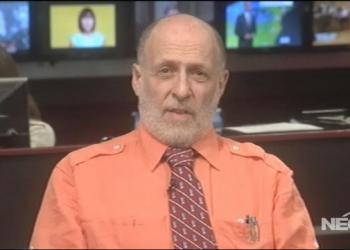
NECN Broadside: WikiLeaks and espionage
Jim Braude interviewed civil rights attorney Harvey A. Silverglate on December 1st about the DoJ statements that they will seek to prosecute Julian Assange and WikiLeaks, potentially under the US Espionage Act. Silverglate, who participated in the Pentagon Papers case and served as the EFF's first litigation counsel, expounded on the difficulties that the US government would face in arguing such a case, and questioned whether it was in the best interests of the government to attempt to bring charges against Julian Assange and WikiLeaks.
He argued that it would be very hard to prove that the United States was harmed by the disclosures, and also that the government could not prosecute charges without having to divulge even more classified information in the process. In Silverglate's opinion, this is a reason why the US government would prefer to see Assange prosecuted in Sweden instead.
The video is available on the NECN website.
BBC HardTalk: WikiLeaks - Open Secrets
In this December 3rd panel show, Host Stephen Sackur speaks with former UK ambassador Carne Ross, former US deputy secretary of state John Negroponte, and WikiLeaks data journalist James Ball about the Cablegate disclosures.
The video is available on the BBC website until December 10th.
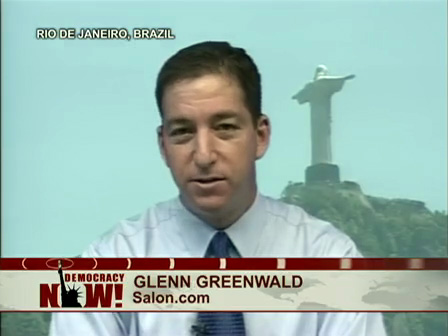
Democracy Now!: Is WikiLeaks’ Julian Assange a Hero?
Amy Goodman and Juan Gonzales hosted a debate between Glenn Greenwald of Salon and Steven Aftergood of Secrecy News on December 3rd.
Glenn Greenwald: "If you look at the overall record of WikiLeaks—and let me just stipulate right upfront that WikiLeaks is a four-year-old organization, four years old. They’re operating completely unchartered territory. Have they made some mistakes and taken some missteps? Absolutely. They’re an imperfect organization. But on the whole, the amount of corruption and injustice in the world that WikiLeaks is exposing, not only in the United States, but around the world, in Peru, in Australia, in Kenya and in West Africa and in Iceland, much—incidents that are not very well known in the United States, but where WikiLeaks single-handedly uncovered very pervasive and systematic improprieties that would not have otherwise been uncovered, on top of all of the grave crimes committed by the United States. There is nobody close to that organization in terms of shining light of what the world’s most powerful factions are doing and in subverting the secrecy regime that is used to spawn all sorts of evils."
The video and full transcript are available on the Democracy Now! website.
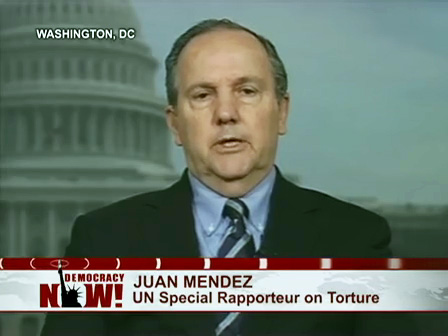
Democracy Now!: U.N. Special Rapporteur Juan Méndez: Instead of Focusing on Assange, U.S. Should Address WikiLeaks’ Disclosures of Torture
Democracy Now! interviewed Juan Méndez, the new U.N. Special Rapporteur on Torture and Other Cruel, Inhuman and Degrading Treatment or Punishment, on December 2nd. The interview focused on Cablegate revelations regarding US spying on UN officials and torture committed under the Bush administration.
Juan Méndez: "What I am really worried about is that we seem to be focusing on whether disclosing these cables is legal or illegal, whether it merits some kinds of action against Mr. Assange. We’re not really discussing the merits, the substance of what some of these things reveal. And in my case, for example, I’m very concerned about the documents that show that literally thousands of people were first imprisoned by American forces and then transferred to the control of forces in Iraq and perhaps even in Afghanistan, where they knew that these people were going to be tortured. That’s a very clear violation of a standard that applies to the United States as a signatory of the Convention Against Torture, and I want to know what’s being done about getting to the bottom of that."
The full video is available on the Democracy Now! website.
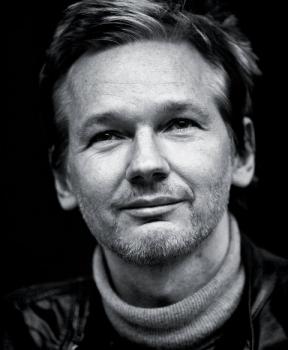
The New York Times' T Magazine features a short profile on Julian Assange and WikiLeaks:
"Julian Assange and WikiLeaks have been jettisoned to fame or notoriety (choose your noun, please) not because of a passing political battle but for reasons much deeper: the desire to possess, distribute and devour information. Ever since the release in July this year of some 92,000 documents relating to America’s involvement in Afghanistan, an old joke from Communist times keeps spinning around my head. ‘‘We cannot predict the future,’’ announces the newsreader of Soviet radio reporting on the Politburo’s deliberations, ‘‘but the past is changing before our very eyes.’’ Now our understanding of the nature of the intervention in Iraq has also changed radically with the publication of a still more astonishing collection of 391,832 secret United States military field reports from the kaleidoscopic theaters of battle.[...]
Assange understands full well the significance of these documents and their surreptitious transmission, and that knowledge translates into power and influence. For most of history, government has enjoyed an easy superiority in adjusting the ebb and flow of information. Now the rules of the contest have changed. In contrast to the petabytes of data flotsam, half-truths and speculation that drift daily around the Internet, WikiLeaks spews forth unvarnished, sensitive truths. Assange’s extraordinary project provides transparency unbridled. Historians, journalists and civic activists will continue to fish in these rich informational waters for some time if the organization does not collapse."
Read more
Photo credit: Max Vadukul, The New York Times
(Please also see parts one, two, three, four, five and six in this series.)
Ryan Gallagher, Open Democracy: Wikileaks: the truth is not treason
"As international reaction testifies, the repercussions of Cablegate are massive. Wikileaks is changing the world without invitation, and the political establishment does not approve.[...]
“You can kill a man but you can't kill an idea,” as the civil rights activist Medgar Evers once said. And an idea is precisely what Wikileaks has become. It is no longer simply a website – it is a pure expression of democratic ideals, a philosophy realised by the force of technology. The powerful may condemn and attempt to repress Wikileaks and all it represents, but the situation has long since spun far from their control. Facilitated by the internet, a new battleground has been established. All traditions now hang in the balance and all bets are off."
Read more
Matthew Down, National Journal: To Tell the Truth
"Everyone in Washington claims to support transparency and government openness during campaign season and when it’s popular to do so. They castigate the other side when it does things in secret and suggest that its intentions must be nefarious if it is unwilling to make its deliberations public. But when an organization discloses how our foreign policy is conducted, some of these same people claim that the release will endanger lives or threaten national security, or that the founder of WikiLeaks is a criminal.
When did we decide that we trust the government more than its citizens? And that revealing the truth about the government is wrong? And why is the media complicit in this? Did we not learn anything from the run-up to the Iraq war when no one asked hard questions about the justifications for the war and when we accepted statements from government officials without proper pushback?[...]
If we want to restore trust in our government, maybe we can start by telling the truth, keeping fewer secrets, and respecting the privacy of average citizens a little more. As Ralph Waldo Emerson once said, “God offers to every mind its choice between truth and repose. Take which you please; you can never have both.”"
Read more
Guy Rundle, Crikey: WikiLeaks -- time for a register
"The first four stories on the UK news tonight were all either created by, or transformed by, the WikiLeaks Cablegate releases.
The governor of the Bank of England has been revealed as no benign public servant, but a player, trying to push the incoming government towards a harsher, more purely Thatcherite economic policy, and worried that they lacked the guts to do it; the Sri Lankan President was greeted with a huge demonstration supercharged with revelations of government involvement in massacres of Tamils; the "special relationship" is being battered by revelations of non-reciprocity on extradition, spy flyovers and the like; and even the separate news of Russia's winning the 2018 World Cup was set in the context of its utter corruption -- something that many people now felt they knew as much about as the elite, dictating the policy we should take towards them.
How long this will go on no-one knows. But while it does, power relations are being subtly transformed in ways that may have effects for some time to come. Once WikiLeaks manage to secure service, and eventually place the Cablegate logs online, there will be three huge volumes -- the Iraq logs, the Afghan logs and Cablegate -- which effectively constitute an alternative history of the present."
Read more
Jim Naureckas, FAIR: WikiLeaks Hasn't 'Leaked' Anything
"Actually, Julian Assange didn't leak anything--he can't, because he didn't have access to classified documents. Someone (or someones) who did have such access leaked those documents to Assange's WikiLeaks, which, as a journalistic organization, made them available to the world, both directly and through other media partners.
This distinction, which is widely ignored in commentary on WikiLeaks, is actually quite important, because the ethical obligations of a government official with a security clearance are quite different from those of a media outlet.[...]
To treat Assange as a leaker when he is, in fact, a journalist is not only morally confusing, it's quite dangerous to journalists in general. If the government can declare Assange to be spy or a terrorist because he's published classified documents he's received, every investigative journalist who does the same thing is in deep trouble."
Read more
John Naughton: What the attacks on WikiLeaks tell us
"Like most people, I’ve only read a fraction of what’s been published by WikiLeaks, but one thing that might explain the official hysteria about the revelations is the way they comprehensively expose the way political elites in Western democracies have been lying to their electorates. The leaks make it abundantly clear not just that the US-Anglo-European adventure in Afghanistan is doomed (because even the dogs in the street know that, as we say in Ireland), but more importantly that the US and UK governments privately admit that too.
The problem is that they cannot face their electorates — who also happen to be the taxpayers who are funding this folly — and tell them this.[...]
What WikiLeaks is exposing is the way our democratic system has been hollowed out. Governments and Western political elites have been shown to be incompetent (New Labour and Bush Jnr in not regulating the financial sector; all governments in the area of climate change), corrupt (Fianna Fail in Ireland, Berlusconi in Italy; all governments in relation to the arms trade) or recklessly militaristic (Bush Jnr and Tony Blair in Iraq) and yet nowhere have they been called to account in any effective way. Instead they have obfuscated, lied or blustered their way through. And when, finally, the veil of secrecy is lifted in a really effective way, their reaction is to try to silence the messenger — as Noam Chomsky pointed out."
Read more
Bernard Keane, Crikey: Missing the point on WikiLeaks
"This rolling series of releases — and WikiLeaks has barely begun to release the amount of material it has — is raising fundamental issues not merely about statecraft and diplomacy but information, power and the role of the media. Guy Rundle spotted this immediately, and while I would say that, wouldn’t I, his analysis has been the best you’ll see in an Australian publication. This is about far more than a simple matter of leaking sensitive cables, or newspaper coverage of those leaks.
Instead we’re given an uncomprehending coverage by the Australian media, as if it simply can’t process what’s happening, and needs to keep trying different narratives to see if they fit what’s being observed, sticking with whatever seems to temporarily do the trick.[...]
It’s not entirely fair to blame the media, though, because the Australian government is doing exactly the same thing. The response of the federal government has been… I was going to say “instructive”, but it’s more accurately, and sadly, affirmative of what you suspected, that politicians and bureaucrats can’t see this through any other than a rather 20th century, Cold War-style lens."
Read more
James Moore, The Huffington Post: WikiLeaks and the Myth of Journalistic Objectivity
"There is a very simple reason WikiLeaks has sent a furious storm of outrage across the globe and it has very little to do with diplomatic impropriety. It is this: The public is uninformed because of inadequate journalism. Consumers of information have little more to digest than Kim Kardashian's latest paramour or the size of Mark Zuckerberg's jet. Very few publishers or broadcasters post reporters to foreign datelines and give them time to develop relationships that lead to information. Consequently, journalism is atrophying from the extremities inward and the small heart it has will soon become even more endangered.
So, long live WikiLeaks and Julian Assange. And if Pfc. Bradley Manning is the leaker, he deserves the Presidential Medal of Freedom.
Good government, if such a thing exists, is the product of transparency. Americans have very little idea of the back-stories that lead to the events they see on the nightly news or read about on the net. How did such messes end up being such messes? If journalism were functioning at appropriate levels, there would have been stories that reported some of the information contained in the cables now published around the globe."
Read more
Nils Molina, The Tech: WikiLeaks serves the global community by keeping governments in check
"WikiLeaks helped expose the looting of Kenya, the corruption of a banking system and sloppy killings committed by the U.S. military. WikiLeaks should be lauded for using truth to pressure these institutions to re-evaluate themselves. Thinking that the U.S. military does not need outside scrutiny to effectively serve the public is as foolish as thinking that the MIT administration can by itself design a good undergraduate dining plan. The entrenched bureaucracy that generates military decisions can fail spectacularly, with history providing examples ranging from the Vietnam War to the often irrational Soviet military build-up. Leaking information that changes how one evaluates a war is free press doing its job. Transparency matters.[...]
Just like a business, the government should respond to the leaks by becoming more open and honest, better hiding the little information that must remain secret and re-evaluating its bureaucratic activities. WikiLeaks is a resilient and powerful organization of journalists. Designating it as a terrorist group, as the incoming chairman of the House Homeland Security Committee has suggested, or engaging in an expensive international chase, as Keith Yost recommends, would be a public relations nightmare."
Read more

RSF: WikiLeaks hounded?
Reporters Sans Frontières (Reporters Without Borders) issued an official statement on WikiLeaks and Cablegate. The French version is available here.
"Reporters Without Borders condemns the blocking, cyber-attacks and political pressure being directed at cablegate.wikileaks.org, the website dedicated to the US diplomatic cables. The organization is also concerned by some of the extreme comments made by American authorities concerning WikiLeaks and its founder Julian Assange.
Earlier this week, after the publishing several hundred of the 250.000 cables it says it has in its possession, WikiLeaks had to move its site from its servers in Sweden to servers in the United States controlled by online retailer Amazon. Amazon quickly came under pressure to stop hosting WikiLeaks from the Senate Committee on Homeland Security and its chairman, Sen. Joe Lieberman, in particular.
After being ousted from Amazon, WikiLeaks found a refuge for part of its content with the French Internet company OVH. But French digital economy minister Eric Besson today said the French government was looking at ways to ban hosting of the site. WikiLeaks was also recently dropped by its domain name provider EveryDNS. Meanwhile, several countries well known for for their disregard of freedom of expression and information, including Thailand and China, have blocked access to cablegate.wikileaks.org.
Theme by Danetsoft and Danang Probo Sayekti inspired by Maksimer